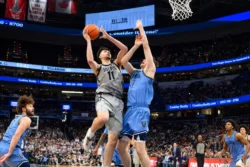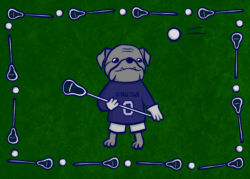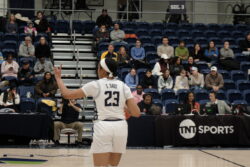Two-time Super Bowl champion quarterback Ben Roethlisberger was suspended for six games yesterday. This suspension is just one in a long line of swift punishments handed down by the NFL Commissioner Roger Goodell.
In suspending the Steelers’ star and one of the most recognizable professional football players in the league, Goodell reaffirmed his rule over the league. It’s a simple formula: Either you abide by Goodell’s standards, or you do not play in NFL games.
The commissioner began his facelift of the league’s image in April of 2007, implementing a new NFL Personal Conduct Policy. The policy gave Goodell the power and discretion to suspend without pay or banish any league personnel for conduct the commissioner deems detrimental to the NFL.
The first player to be suspended under the new policy was Adam “Pacman” Jones, for his slew of well-documented involvements in strip club shootings. Jones was never convicted of a crime, but Goodell still suspended him for the season. This sent a clear message to all players in the league: Even if the law doesn’t find you guilty, you are not necessarily beyond Goodell’s reach.
Ben Roethlisberger’s personal problems in the league began in June 2006 with a motorcycle crash. Roethlisberger suffered severe injuries to his head in the crash, perhaps worsened by the fact that he was not wearing a helmet. Combined with his expired temporary license for the vehicle, the incident caused great concern within the league and the Steelers franchise.
Roethlisberger’s problems deepened in July of 2009 when he was sued in civil court for sexually assaulting a woman in his hotel room a year earlier. Roethlisberger’s lawyers say they are confident the claim is baseless, but the case is still pending.
The star’s most serious personal conduct gaffe to date occurred this March in Milledgeville, Georgia. At a nightclub, Roethlisberger allegedly encouraged a group of college girls to take numerous shots with him in the VIP section. One of Big Ben’s bodyguards ushered one of the girls down a hallway and then left. Roethlisberger then approached her, exposed himself, and followed her into the women’s bathroom despite her protests. They then allegedly had sex, while the victim’s friends—who could not get past Roethlisberger’s bodyguards—tried unsuccessfully to intervene.
Police in Georgia investigated the case, and on April 12, District Attorney Fred Bright held a press conference detailing the findings of the investigation, announcing that there was not enough evidence to proceed with an arrest. The victim also did not want to press charges, saying she did not want that kind of intrusion into her personal life. But she did not rescind her accusation.
After conducting his own investigation, Goodell felt Roethlisberger was in violation of the NFL’s Personal Conduct Policy, and handed down his suspension. Goodell was completely justified in his actions—Big Ben had disgraced himself and the league.
Some say Goodell has too much power, since he can suspend players without a legal conviction. In Goodell’s NFL, players are held to a higher standard than the law requires. Playing professional football is a priviledge, something Goodell makes sure his players understand and don’t abuse.
Although the NFL under this commissioner has been called the No Fun League, Goodell has ushered in an era of higher personal standards on and off the field that benefit both players and fans. If players can only have fun by bringing guns to nightclubs and racking up rape accusations, then they can find a new profession. So, Roger, keep up the good work—protect your shield.






You know what? The Nats are still .500.